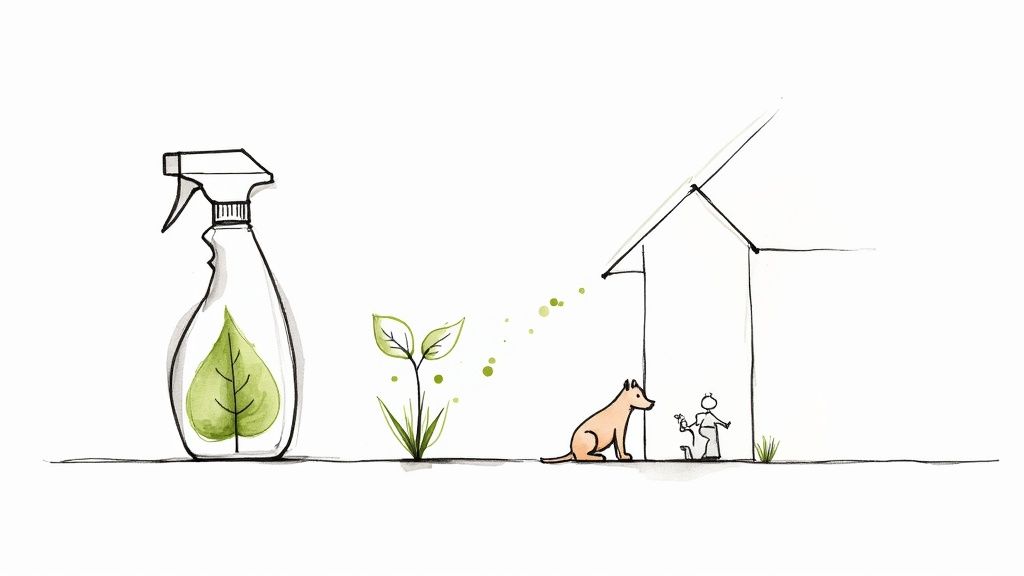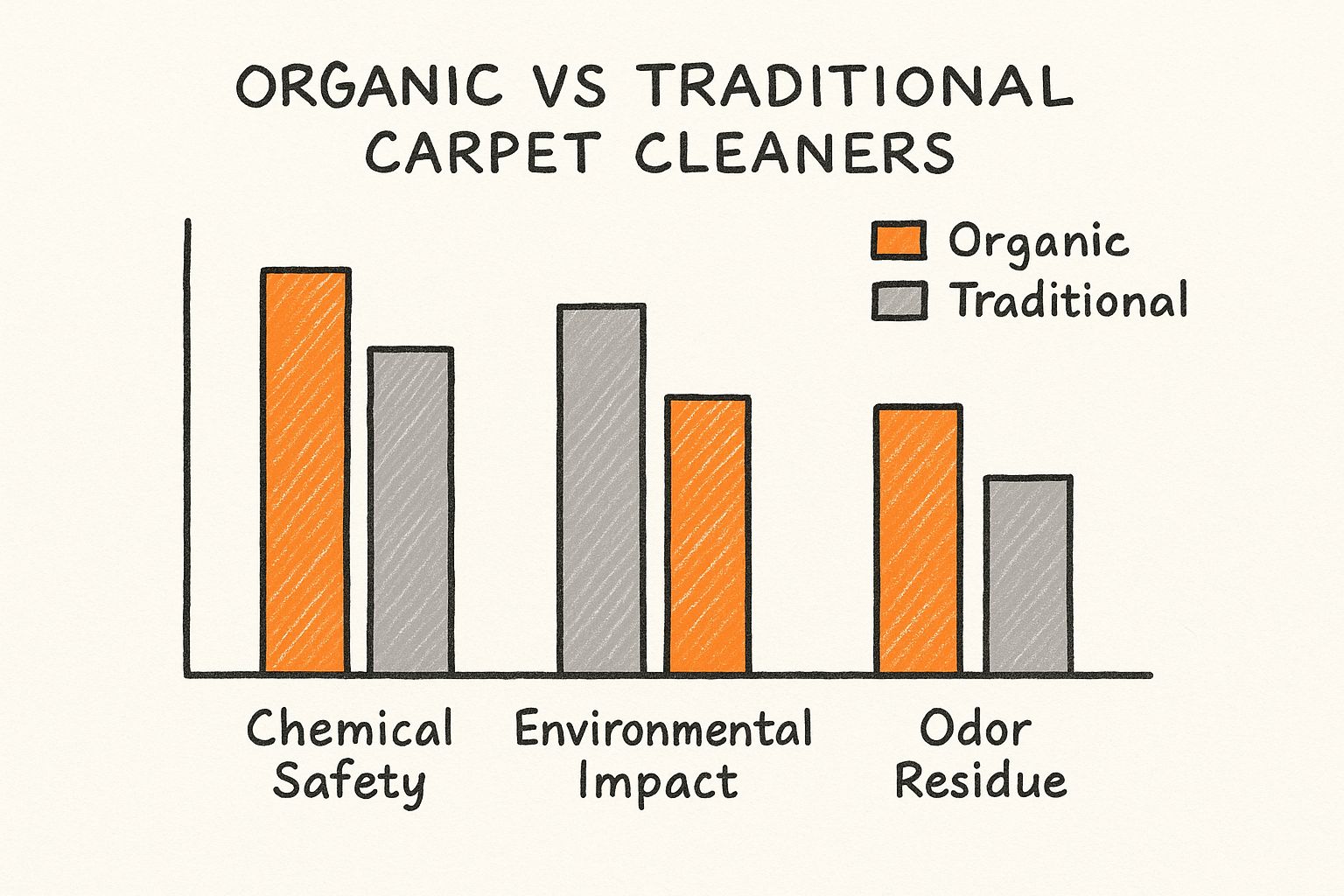When you hear the term "organic carpet cleaners," don't just think of a cleaning product. Think of it as a whole philosophy—one that’s rooted in nature. It’s about choosing to clean your home with solutions made from plant-based, biodegradable ingredients instead of the usual harsh, synthetic chemicals.
It’s a lot like choosing whole foods over processed junk for your family. One nourishes and is naturally safe, while the other can be full of things you can't even pronounce. Applying that same logic to your home just makes sense.
What Exactly Are Organic Carpet Cleaners

For decades, the carpet cleaning industry has relied on aggressive, manufactured chemicals like ammonia or chlorine to get the job done. The "organic" approach completely flips that script. It steps away from those often-toxic formulas and instead looks to ingredients pulled directly from natural sources.
Think about the difference between a synthetic air freshener spray and a freshly cut lemon. The spray just masks bad smells with more chemicals. The lemon, on the other hand, uses its own powerful, natural oils to genuinely neutralize odors, leaving behind a clean, pleasant scent. That's how organic carpet cleaners work—they harness nature's power to break down dirt and stains without leaving a chemical mess behind.
Core Principles of Organic Cleaning
The whole idea behind organic cleaning isn't just to make a carpet look clean. The real goal is to create an indoor environment that is actually healthier for you, your kids, and your pets. This commitment shows in the kinds of ingredients used.
You'll often find components like these doing the heavy lifting:
- Plant-Based Solvents: Things like citrus oils are nature's degreasers. They cut through sticky, oily grime like nobody's business. You can learn way more about how citrus-based cleaning tackles the toughest messes in our guide.
- Natural Enzymes: These are amazing little proteins that literally "digest" specific types of stains, like pet urine or spilled food. They break the mess down at a molecular level.
- Biodegradable Surfactants: These are the agents that help lift dirt away from the carpet fibers so it can be extracted. The best part? They break down safely and don't harm the environment.
This isn't just some fringe movement, either. People are waking up to the risks of harsh chemicals. The global market for carpet cleaning products was valued at USD 1.66 billion and is on track to hit USD 2.58 billion, a jump driven almost entirely by consumers demanding healthier, eco-friendly options. You can read more about this market shift on expertmarketresearch.com.
At the end of the day, making the switch to organic carpet cleaning is about peace of mind. It means you don't have to worry when your toddler is crawling on the floor or when your dog is snoozing on the rug. You know they're not inhaling toxic fumes or coming into contact with chemical residues, and that's a feeling you can't put a price on.
How Natural Ingredients Powerfully Clean Carpets

It’s the question I hear all the time: can something "natural" really get my carpets clean? I get it. We've been taught that you need harsh chemicals to tackle tough stains.
But the answer is a definite yes. The science behind it is actually pretty cool and, believe it or not, a lot smarter than the old brute-force methods.
Think about it this way. Traditional cleaners are like bulldozers, blasting away at dirt with aggressive, often toxic, chemicals. Organic solutions are more like skilled surgeons. They use nature's own chemistry to target the molecular structure of a stain and dismantle it from the inside out.
The One-Two Punch of Enzymes and Citrus Oils
In nature's cleaning arsenal, two of the heavy hitters are enzymes and citrus oils. They each have a specific job, and they do it incredibly well.
Enzymes are basically the digestive system for stains. These specialized proteins target specific types of messes—think pet urine, spilled food, or blood—and break them down into tiny particles. Once broken down, they can be easily lifted away from the carpet fibers. This targeted approach is why they work so well on organic messes. To really dig into how they work, you can check out our guide on what is an enzymatic cleaner?.
Then you have citrus oils. The real workhorse here is a compound called d-Limonene, which comes from orange peels. This stuff is nature’s ultimate degreaser. It dissolves all that sticky, oily gunk that builds up in high-traffic areas and makes your carpet look dull and dirty.
The real magic happens when you put them together. The enzymes will break down a pet stain, while the citrus oil cuts through the greasy dirt that got tracked in from the garage. It's a powerful combination that leaves carpets truly, deeply clean.
Why Natural Chemistry Just Works Better
Here’s something most people don’t realize about chemical cleaners: they often leave behind a sticky, soapy residue. And what does that residue do? It attracts more dirt, creating a vicious cycle where your carpets get dirty again faster.
Organic formulas, on the other hand, rinse away completely clean. This is a huge reason why carpets cleaned with organic carpet cleaners stay fresh and clean for much longer. We're not just masking the problem; we're removing the source entirely.
These ingredients are also incredibly gentle on your carpet fibers. They go to work on the stain without causing damage. You can see just how versatile and powerful these compounds are by exploring the uses of natural ingredients like citric acid in all sorts of cleaning jobs. It proves you can get a deep clean that is both tough on dirt and gentle on your home.
So, "natural" doesn't mean weak. It means smarter, more specialized, and much more effective in the long run.
Organic Cleaners vs. Traditional Cleaners Compared
Deciding between organic carpet cleaners and the traditional, chemical-heavy kind can feel like a tough choice. One path is familiar, promising a powerful clean. The other offers a healthier, more natural approach. To really figure out what's best for your home, it helps to see a straight-up, head-to-head comparison of what makes them so different.
The real difference isn't just about what’s in the bottle. It’s about the entire experience—and what gets left behind after the cleaning crew leaves. Traditional cleaners often lean on harsh chemicals that can leave a funky chemical smell and a sticky residue that, ironically, attracts more dirt over time. Organic solutions, on the other hand, are designed to clean just as effectively but leave nothing behind but a fresh, safe surface for your family.
A Look at the Ingredients
The biggest difference is right in the formula. Traditional cleaners are often packed with manufactured compounds like perchloroethylene (a chemical also used in dry cleaning), naphthalene (a toxic substance made from coal tar), and various other chemicals that can be tough on your carpet fibers and your indoor air.
Organic cleaners go a completely different route. They're built from ingredients sourced from nature, things like:
- Plant-Based Solvents: Think citrus and pine oils. These are nature's degreasers, and they work wonders on oily, sticky messes.
- Enzymatic Solutions: These are special proteins that actually break down and digest organic stains, like the ones left behind by pet accidents.
- Natural Minerals: Ingredients like baking soda are fantastic for neutralizing odors without just covering them up with artificial fragrances.
This infographic really nails the key differences in safety, environmental impact, and what's left behind after the job is done.

As you can see, organic cleaners have a clear edge when it comes to chemical safety and being friendly to the environment. Plus, they get rid of that harsh chemical smell you often get with old-school cleaning methods.
To lay it all out, here’s a simple table comparing the two approaches side-by-side.
Comparing Organic and Traditional Carpet Cleaning Methods
| Feature | Organic Cleaners | Traditional Cleaners |
|---|---|---|
| Main Ingredients | Plant-based solvents, natural enzymes, minerals | Synthetic detergents, chemical solvents (e.g., perchloroethylene) |
| Safety | Non-toxic, safe for kids and pets | Can contain harsh chemicals that cause irritation |
| Residue | No sticky or harmful residue left behind | Often leaves a soapy, sticky residue that attracts dirt |
| Odor | Light, natural scent (e.g., citrus) or no scent | Strong chemical smells that can linger |
| Environmental Impact | Biodegradable and eco-friendly | May contain non-biodegradable chemicals harmful to waterways |
| Effectiveness | Excellent on organic stains and everyday grime | Can be effective but may damage delicate fibers over time |
This comparison makes it pretty clear that while both aim to clean, their impact on your home environment is worlds apart.
Comparing Long-Term Effects
Beyond the immediate clean, what really matters are the long-term effects on your home and health. The gunk left behind by many traditional cleaners can irritate skin, flare up allergies, and pose a risk to curious pets and little kids who live on the floor. That lingering dampness and chemical fume combination isn't great for your indoor air quality, either.
In contrast, organic methods are all about creating a healthy home environment. Because they use biodegradable and non-toxic ingredients, there are no harmful residues left behind. This means your carpets aren't just clean—they're genuinely safe for everyone in the family.
This move toward safer products is showing up in the market, too. The global carpet cleaner market was valued at USD 776.62 million and is expected to hit USD 1,321.03 million in the next few years. A huge reason for this jump is that more and more homeowners are demanding eco-friendly and non-toxic options. If you're curious, you can learn more about carpet cleaner market trends. This growing market is great news for homeowners—it means better access to high-quality organic carpet cleaners than ever before.
The Health Benefits of a Toxin-Free Home

Choosing an organic carpet cleaner isn't just about getting the dirt out. It's a choice you make for a healthier home. This decision has a real, direct impact on your family’s well-being by improving the very air you breathe every single day.
Many traditional cleaners leave behind more than just a clean scent—they release Volatile Organic Compounds (VOCs). Think of these as invisible chemical clouds that can hang around long after the cleaning crew has left, tanking your indoor air quality.
These airborne chemicals are often linked to a whole list of issues, from nagging headaches and dizziness to full-blown respiratory irritation. When you opt for a professional service that uses organic carpet cleaners, you’re kicking that source of indoor pollution to the curb and creating a safer sanctuary for your family.
Protecting the Most Vulnerable
Who spends the most time on the floor? Your kids and your pets. That means they are the most exposed to any chemical residues left behind. A baby crawling across a freshly "cleaned" rug or your dog napping in that sunny spot will have direct contact with whatever was used to treat it.
This is where the peace of mind from organic solutions really shines. When the cleaning agents come from plants and natural minerals, you sidestep the risk of exposing your loved ones to harsh, synthetic junk. No more worrying about skin irritation or what happens if they ingest some of those mystery chemicals. You can read more about why carpet cleaning can be a health concern in our detailed guide.
When your home is cleaned with non-toxic, biodegradable solutions, you’re not just cleaning your carpets—you’re actively protecting the health of your children and pets, ensuring their play space is as safe as it is clean.
The Environmental Ripple Effect
The upside of going organic doesn't stop at your front door. The stuff in conventional carpet cleaners doesn't just vanish. It gets washed down the drain and can eventually find its way into our local waterways.
A lot of these chemicals aren't biodegradable and can seriously harm aquatic life, messing up delicate ecosystems. Organic carpet cleaners, on the other hand, are made to break down naturally and safely.
By choosing eco-friendly options, you’re making a real, positive impact. You're helping keep our water systems cleaner and supporting a more responsible way of taking care of your home. It’s a simple change that sends a huge positive ripple out into the world.
Alright, you've decided to go with an organic carpet cleaner—great choice! Now for the tricky part: finding a company that actually is organic and not just pretending to be.
With everyone jumping on the eco-friendly bandwagon, some companies have gotten really good at "greenwashing." They use all the right words—natural, green, eco-safe—but their methods are the same old chemical-heavy processes. You have to know what to look for to avoid getting duped.
Think of it like hiring any other professional to work in your home. You wouldn't hire the first plumber you find in a search, right? You'd check their credentials, see what other people are saying, and make sure they know what they're doing. You need to apply that same level of care here to make sure you're getting a genuinely healthy, chemical-free clean.
Vetting Potential Cleaning Companies
First things first, pull together a short list of local companies that claim to be organic. Now, it's time to play detective. A truly organic and reputable service will be an open book; they'll be happy to answer your questions and explain their process. If you get vague answers or they seem defensive, that's a huge red flag.
Here's a simple checklist to guide you when you call them up:
- "What exactly are you using to clean my carpets?" Don't settle for "plant-based cleaners." Ask for the product names. A legitimate organic cleaner will be proud to tell you what's in their solution, often pointing to ingredients like citrus oils or natural enzymes.
- "Do you have any third-party certifications?" This is a big one. Look for seals from respected groups like Green Seal or the Environmental Protection Agency's (EPA) Safer Choice program. These aren't just marketing fluff; they prove a product has met serious health and environmental standards.
- "Can you walk me through your cleaning process?" Many of the best eco-friendly cleaners use a low-moisture system. This is a good sign because it cuts down on water waste and, more importantly for you, helps prevent mold and mildew from ever getting a foothold.
- "Will the price you quote me be the final price?" A trustworthy company will give you a clear, all-inclusive quote. You shouldn't be surprised with extra fees for things like "spot treatments" or high-traffic areas—that should be part of the job!
A good company will welcome your questions. They see it as a sign you're an informed customer, not a pain. Their willingness to be transparent tells you everything you need to know about their commitment to what they do.
Reading Between the Lines of Customer Reviews
Reviews are gold, but you have to look past the star rating. Dig into the comments and look for specific details that tell the real story about their "organic" service.
Keep an eye out for reviews that mention things like:
- No Lingering Chemical Smells: Phrases like "my house just smelled fresh and clean" or "no chemical odor at all" are exactly what you want to see.
- Fast Dry Times: Comments about the carpets being dry in just a few hours usually point to a low-moisture process, a hallmark of the good guys.
- Safety for Kids and Pets: When a parent talks about their peace of mind letting their toddler crawl on the freshly cleaned floor, or a pet owner mentions their dog's allergies seem better, that's a powerful endorsement.
The demand for healthier home services is blowing up. The global market for carpet and upholstery cleaning is expected to hit a massive USD 120.8 billion as more people like you look for better, safer solutions. You can discover more insights about this growing market. While this means you have more choices, it also means you have to be extra careful to find a company that truly delivers on its promises.
Simple and Effective DIY Organic Cleaning Recipes
While there's no substitute for a professional deep clean, sometimes you just need a quick fix for a small spill or want to freshen things up between visits. For those moments, you don't need to run to the store—your kitchen pantry probably has everything you need.
These DIY recipes are surprisingly powerful, easy to whip up, and best of all, they're free from the harsh chemicals lurking in most store-bought spot cleaners.
But before you go mixing, please remember the golden rule of carpet care: always patch test! Find a hidden spot, like inside a closet or under the couch, and apply a tiny amount of your solution. This quick check ensures it won't mess with the color or texture of your carpet.
Quick Fixes for Common Spills
For most everyday mishaps, you don’t need some complex, multi-ingredient formula. A few simple household staples can work wonders if you know how to use them.
Here are my three go-to recipes for the most common types of stains:
-
The All-Purpose Vinegar Solution: Just mix equal parts white vinegar and plain water in a spray bottle. This is your workhorse for general grime, mystery spots, and light stains. The natural acidity in vinegar is fantastic for breaking down dirt without being too harsh on most carpets.
-
The Grease and Oil Lifter: Dropped a greasy piece of pizza? Don't panic. Liberally sprinkle cornstarch or baking soda directly onto the oily spot. Let it sit for at least 15-20 minutes to soak up the grease, then vacuum it all up. If any discoloration is left, hit it with your vinegar spray.
-
The Red Wine Rescue: The key here is speed. If you catch a red wine spill while it's fresh, grab some club soda. First, blot the stain with a clean cloth—never rub! Then, pour a little club soda on it. The bubbles help lift the stain right out of the fibers, which you can then blot away.
Important Note on Materials: While these tricks are great for most synthetic carpets, you have to be careful with natural fibers. Ingredients like vinegar can be too aggressive for delicate materials like wool or silk. When in doubt, it’s always best to call a professional for those.
And if you want to keep that fresh, clean feeling going, you can even make your own natural deodorizing carpet powder. These simple, hands-on approaches are a great way to maintain a healthy, toxin-free home.
Still Have Questions About Organic Carpet Cleaning?
It’s only natural to have a few questions before you switch things up. Most people wonder if a cleaner that comes from plants can really cut through the kind of grime that’s been building up in their carpets for years.
We get it. Let’s tackle the most common questions head-on so you can feel good about your choice for your home and family.
Are Organic Cleaners Really as Strong as the Chemical Stuff?
Yes, absolutely. For almost every mess you'll find in a typical home, organic cleaners do an incredible job. The secret is that they use specialized ingredients for specific jobs.
Think of it this way: enzymatic cleaners are practically designed to break down and completely digest organic stains like pet urine or a spilled glass of milk. For the everyday oily, sticky dirt that gets tracked in, citrus-based degreasers are superstars. They dissolve all that gunk without leaving any chemical residue behind.
The only time you might need something different is for a really unusual, industrial-type stain like permanent ink or paint. For everything else, organic solutions work beautifully.
Is This Going to Cost Me More?
The price can be similar, but the value is way better. A professional organic cleaning service is often priced right alongside a high-end traditional one, but the real win is in the long-term benefits. Plus, if you're into DIY, homemade organic recipes are dirt cheap.
When you think about the fact that you’re not bringing harsh chemicals into your home, improving your air quality, and helping your carpet last longer, the investment makes a lot of sense. It’s a smarter financial decision over time.
Choosing organic cleaning isn't just about the price tag today. It's an investment in your family's well-being, better indoor air, and getting more life out of your carpets.
Can I Use These Cleaners in a Rental Machine from the Store?
You sure can. Most of the liquid organic carpet cleaning solutions you can buy are made to work perfectly with the standard steam cleaners you rent or own. They're designed specifically for hot water extraction, which is what those machines do.
Just follow the directions on the machine for adding the cleaning solution. The key is to use the amount they recommend—don't go overboard! This will get you a deep clean without soaking your carpet, leading to a much faster and healthier dry time.
Ready to see for yourself what a deep, healthy clean feels like, without any of the harsh chemicals? The team at Citrus Carpet Cleaning Buford uses a powerful, low-moisture citrus-based system that leaves your carpets fresh, residue-free, and dry in hours, not days. Get your free, no-obligation "EXACT-imate" today by visiting us at https://citruscarpetcleaningatlanta.com.

